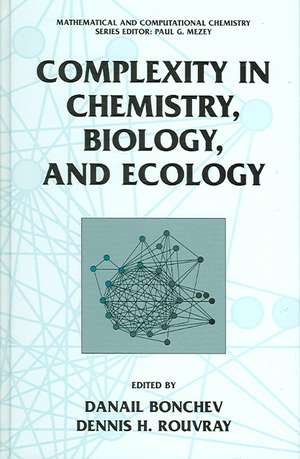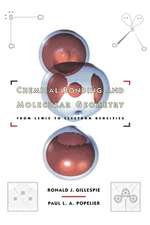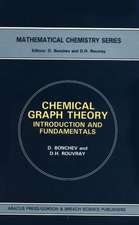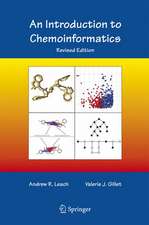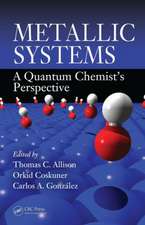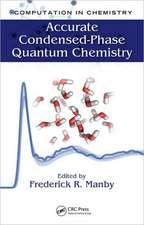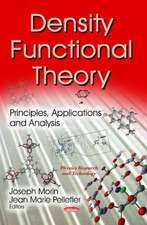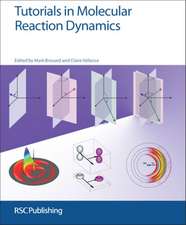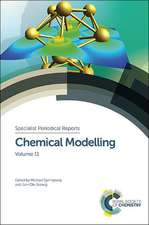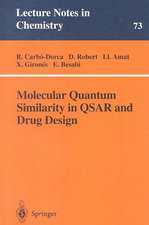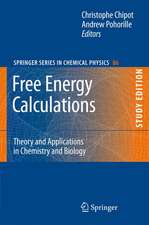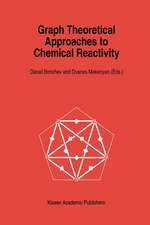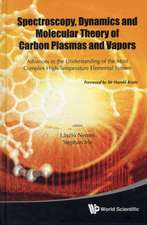Complexity in Chemistry, Biology, and Ecology: Mathematical and Computational Chemistry
Editat de Danail D. Bonchev, Dennis Rouvrayen Limba Engleză Hardback – 24 oct 2005
| Toate formatele și edițiile | Preț | Express |
|---|---|---|
| Paperback (1) | 947.85 lei 6-8 săpt. | |
| Springer Us – 8 dec 2010 | 947.85 lei 6-8 săpt. | |
| Hardback (1) | 650.37 lei 6-8 săpt. | |
| Springer Us – 24 oct 2005 | 650.37 lei 6-8 săpt. |
Preț: 650.37 lei
Preț vechi: 765.14 lei
-15% Nou
Puncte Express: 976
Preț estimativ în valută:
124.46€ • 129.15$ • 104.03£
124.46€ • 129.15$ • 104.03£
Carte tipărită la comandă
Livrare economică 17-31 martie
Preluare comenzi: 021 569.72.76
Specificații
ISBN-13: 9780387232645
ISBN-10: 0387232648
Pagini: 348
Ilustrații: XX, 348 p.
Dimensiuni: 155 x 235 x 22 mm
Greutate: 0.69 kg
Ediția:2005
Editura: Springer Us
Colecția Springer
Seria Mathematical and Computational Chemistry
Locul publicării:New York, NY, United States
ISBN-10: 0387232648
Pagini: 348
Ilustrații: XX, 348 p.
Dimensiuni: 155 x 235 x 22 mm
Greutate: 0.69 kg
Ediția:2005
Editura: Springer Us
Colecția Springer
Seria Mathematical and Computational Chemistry
Locul publicării:New York, NY, United States
Public țintă
Professional/practitionerCuprins
On the Complexity of Fullerenes and Nanotubes.- Complexity and Self-Organization in Biological Development and Evolution.- The Circle That Never Ends: Can Complexity be Made Simple?.- Graphs as Models of Large-Scale Biochemical Organization.- Quantitative Measures of Network Complexity.- Cellular Automata Models of Complex Biochemical Systems.- The Complex Nature of Ecodynamics.
Textul de pe ultima copertă
This book, written by an international team of experts, introduces the reader to various aspects of complexity theory and its applications. It illustrates the latest trends in science to go beyond the mechanistic Newtonian view of the world by shifting the focus to self-organization, adaptation, and emergent phenomena. The authors discuss these properties of complex systems in biology, ecology and chemistry along with the structure and interconnectedness of the "layers" of complexity. The qualitative description is complemented by a discussion of methods for complexity quantification. Networks are covered in detail as a universal language of the complex world.
General readers, as well as undergraduate and graduate students and researchers in life sciences, chemistry, and nanotechnology will find this book to be of great interest.
General readers, as well as undergraduate and graduate students and researchers in life sciences, chemistry, and nanotechnology will find this book to be of great interest.
Caracteristici
Offers new concepts and ideas that broaden reader’s perception of modern science Internationally established experts present the inspiring new science of complexity, which discovers new general laws covering wide range of science areas Offers a broader view on complexity based on the expertise of the related areas of chemistry, biochemistry, biology, ecology, and physics Contains methodologies for assessing the complexity of systems that can be directly applied to proteomics and genomics, and network analysis in biology, medicine, and ecology Includes supplementary material: sn.pub/extras
